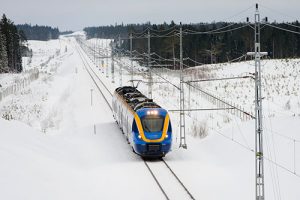The International Railway Journal reports that 4G and 3G mobile networks are causing severe interference to safety-critical GSM-R radio communications.
Sweden’s railway sector is currently engaged in an intensive programme to combat the problem by a self-imposed deadline of July 1st.
Kevin Smith, of Trafikverket, reports on the project’s progress, “For mission-critical radio communications, Swedish passenger and freight operators, like many of their contemporaries from around the world, utilise GSM-R, an international wireless communications standard for railway communication and applications, and the radio communications component of ERTMS. The GSM signal provides a dedicated link between trains and control centres and in Sweden operates within the 900MHz band. Unfortunately GSM-R signals are very sensitive to interference caused by public 3G and 4G signals within the same band, a situation confounded by the Swedish government’s decision in 2011 to allow mobile operators to use the frequency for their future wideband 3G and 4G networks.”
Smith continues, “In Sweden, four mobile network operators are active with GSM, 3G and 4G networks in the 900MHz frequency, including two 5MHz UMTS networks and a 10MHz LTE network. The problems with GSM-R interference are caused either by wideband networks transmitting signals over a broad set of frequencies, which are stronger than the GSM-R receiver can handle or a higher level of noise (unwanted emissions) from the Process Management Object (PMO) base stations.”
In practice interference can result in GSM-R radio coverage blackspots, a safety-critical issue for railways, and one that Trafikverket, and the government, are striving to avoid. To mitigate these problems, Sweden’s mobile network operators were required in 2011 to limit the power of their networks close to railway lines to prevent any interference with the safety-critical GSM-R signal, with Trafikverket operating measurement trains to monitor that this was the case. In addition Trafikverket agreed to increase GSM-R signal levels to handle increased noise from unwanted emissions. However, at the beginning of 2015, this situation became untenable.
With other European countries also hosting GSM-R and wideband mobile networks on the same frequency, the issue of GSM-R interference is not unique to Sweden. Mr Anders Åkesen, Trafikverket’s head of ERTMS project, says that “the company has received requests from other infrastructure managers about how they have tackled their respective issues.”
“This will happen on a wide scale in Europe,” Åkeson says. “We have already worked with Banedanmark and Jernbaneverket [in Norway] on this, and people are gradually becoming aware of the issues they may face.”
To read more, click here.
 Image, courtesy International Railway Journal.
Image, courtesy International Railway Journal.
